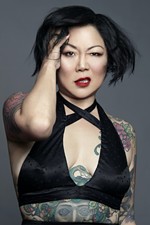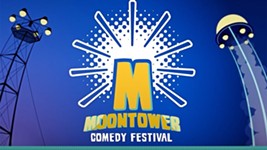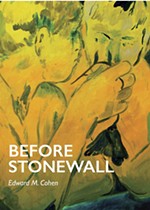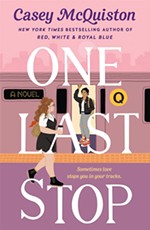Moontower Comedy 2019: Joel Kim Booster
The L.A. comic on the politics (and bravery) of being hot
By Rosalind Faires, 4:30PM, Wed. Apr. 24, 2019
It turns out there’s a lifehack when it comes to figuring out whether comedian Joel Kim Booster is your cup of tea. It just takes a minute. It’s all about how you respond to the Sphynxian riddle he posted to the free and open to public website Twitter on Tuesday, April 9:
“You’re in the middle of a human centipede between Jude Law and Richard Madden – who’s sewn to your butt and who’s sewn to your mouth and why? Really think about this. There IS a correct answer.”
You don’t, it turns out, have to know his backstory (adopted and raised by white, conservative Christians, famously joking that he knew he was gay before he knew he was Asian), listen to his wry and rollicking 2017 comedy album, Model Minority, watch his Comedy Central stand-up special or any of the tremendously funny shows he’s written for (The Other Two, Big Mouth, Billy on the Street) to get a feel for Booster. It’s all going to boil down to this prompt. Do you walk away because it’s preposterous or you don’t care about Law and Madden or you’ve been trying to Eternal Sunshine of the Spotless Mind-away the concept of a human centipede from your brain since 2009? Or do you stay, lean in, polish a pros and cons list, and get an argument started in your groupchat?
Everyone in the former category: I release you. Everyone in the latter: Have I got a comic for you.
Austin Chronicle: For my own peace of mind, can you share what the correct answer to the human centipede hypothetical is?
Joel Kim Booster: [Laughs] It’s Jude in the back. For sure. Because just – he has more experience, and I’d rather hear Richard talk. It seems obvious! But I know more about Jude’s diet, and that’s the thing that people were afraid to really grapple with in that hypothetical, was the reality. People went immediately to, “Whose ass would I rather eat?” and you know what? That’s facile. That’s a facile way of thinking about that hypothetical. But also I think people were correct.
AC: So much of your album and your special centered around intimate details of your personal life and upbringing, but you’re also a comedian who plays with a stage persona. I’m curious about how you negotiate between the two.
JKB: I learned to do stand-up from telling stories about my own life. When I was learning, when I was doing storytelling shows, like, that’s all earnestness, that’s all sincerity and honesty. And that’s definitely still part of my comedy – 'cause I am, I think, a naturally earnest person, much to my own frustration – but I do think that for comedy to work, at least for my comedy to work, there needs to be a little bit of an edge and some surprises. And I think it can very easily go into a sort of maudlin place if I’m just talking about my upbringing.
And the other part of it is giving myself some distance from the stories. Like I learned early on both comedically and from a writing and storytelling perspective, it’s really hard to tell the story when you’re still inside of it. So in the absence of distance from certain stories, crafting a very specific point of view from which to talk about my life and circumstances is helpful. You know, I hear this a lot, this review about certain kinds of stand-ups, especially in this school of confessional, autobiographical comedy: “Oh my god, it sounds like I’m just sitting in on someone’s therapy session.” And I never want that to be the experience of watching my show. So for me, if I create this character of Hot Idiot Talking About These Issues, it gives the audience slightly more license to laugh than if they were watching me very earnestly talk about the trauma of my childhood.
AC: You came to comedy by way of theatre. Do you feel like that theatrical sensibility is coming into play more as your career expands and moves forward?
JKB: Yes and no? It definitely was a really great thing to have on hand. I think most comics when they start, they’re either extremely charismatic and great onstage and don’t have many jokes or they’re incredibly sharp writers who sort of cave in on themselves onstage and have no presence. And we’re all sort of trying to balance that out in the beginning. For me, coming from a theatrical background, I was so comfortable onstage that I could wring a laugh out of nothing and honestly, it took until I moved to New York for me to really sharpen the set-up/punch line structure of joke writing that I think I have somewhat gotten down now.
But the other thing that I think I understand about live performance that has really helped me in comedy that I’ve taken from my theatre days is the immediacy of being with a crowd. Like I am so thankful for all the stand-up I’ve been able to do on television, on late night, my special and random appearances, but they all end up on YouTube and they end up without any context, the context of the room. Like there’s so much that happens between me and an audience when I’m performing live, and I can gauge and turn up the volume on the earnestness if I need to or turn up the character if I need to. I think the longer you do it, the more it’s in your muscle memory to know what the right ratio is? But it is still a little bit of a negotiation with every new audience. And I think that’s true of theatre, and having that in me, in my understanding of my performance, is really helpful now.
AC: It seems like between your stand-up, co-producing and writing for The Other Two and co-hosting Comedy Central’s Unsend with Patti Harrison, you have a nice balance of solo and collaborative work. How do these different types of comedy interplay with each other? Do you feel like, say, writing for television scratches an itch that stand-up doesn’t?
JKB: Yes, definitely! It really does. Because my stand-up – like the kind of jokes that I pitch for The Other Two or in any narrative room, they’re so different from the kinds of jokes I tell onstage. For me, writing narrative – and this is true when I was writing scripts and plays in undergrad and in Chicago before I moved on to comedy full-time – I prefer the subtle realism of, like, an interaction that doesn’t read as a joke without the full context of who these characters are and where they’re from and what’s going on before and after. It’s a fuller picture. In stand-up, there’s a need for the joke to hit in a 15-minute set, you know? You have less time, there’s less context, so there needs to be a broadness? I mean, specificity is important in a different way in stand-up than in script-writing. So, yeah, the short of it is: They definitely scratch two different itches. I’m much more, I think, cerebral when I’m writing a script and I’m in my head a lot more crafting the minute details of words and – punctuation, even, is so big. Whereas I have never written down a joke that I’ve told onstage ever. The most I’ve ever written down is maybe a couple of words of the premise and that’s it. Whereas I can pore over one line in a script for an hour. So it’s such an odd – I feel like I’m using two completely different brains.
AC: Before we go, I wanted to give you the opportunity to talk about an issue that I know means a lot to you: discrimination against hot people. Is there anything you want people to know? Anything the community can do to prevent this scourge?
JKB: [Laughs] You know, it’s really funny because I think there’s this idea – I get it mostly from straight comics who see my Instagram page and are like, “That’s not comedy,” and it’s like, no shit. Most of my life, whether I want it to or not, doesn’t actually revolve around comedy, so give me this little corner of my life that’s for me and will help me get laid.
I think there’s this idea that like, the words and the jokes themselves should be the only thing that we think about. And I hear so many guys say, “I have 17 pairs of the same jeans and five shirts because I don’t want to use any brain space thinking about what clothes I wear,” and that is so fetishized in traditionally masculine art arenas like this? And so it’s kind of, [scoffs] to care about what you look like, to put any thought into your clothes at all is so silly. And for me, I don’t know. I wish I could get laid looking like some of these guys look. But unfortunately, that’s not an option for me. I have to look like this in order to sleep with the people who look like this, who I want to sleep with. And trust me, no one is more upset about that than I am.
But here’s what I’ll say about being hot and doing comedy. Scientifically, looking at a person who is conventionally attractive releases stress hormones in another person’s body. So it’s actually harder for me to do this job and look the way I do than to look like Kevin James. So I’m actually setting a bar so high – for me to clear it every night and get the laughs I do? While looking like this? It’s actually a handicap! It’s sort of incredible. And I think that they, by sort of tricking us into thinking that looking schlubby is actually a part of [comedy], they’re actually making their jobs easier because they’re not stressing out their audiences. It’s science. There is cortisol being released into everyone’s brains as they’re watching me on stage and it makes my job even harder, and yet, I persist.
Joel Kim Booster will perform at the 2019 Moontower Comedy Festival:
• in Bye Felicia! Thu., April 25, 8:15pm, at Palm Door on Sixth
• with Nicole Byer Thu., April 25, 10:15pm, at Palm Door on Sixth
• in Las Culturistas Fri., April 26, 6pm, at Speakeasy
• in Blue Moon Fri., April 26, 11:30pm, at the Parish
• in Unhinged Sat., April 27, 8:30pm, at Fallout Theater
• in Major FOMO Sat., April 27, 10:30pm, at Palm Door on Sixth
A note to readers: Bold and uncensored, The Austin Chronicle has been Austin’s independent news source for over 40 years, expressing the community’s political and environmental concerns and supporting its active cultural scene. Now more than ever, we need your support to continue supplying Austin with independent, free press. If real news is important to you, please consider making a donation of $5, $10 or whatever you can afford, to help keep our journalism on stands.
Robert Faires, June 10, 2021
Robert Faires, Aug. 4, 2020
June 25, 2021
June 4, 2021
Moontower Comedy & Oddity Festival, Moontower Comedy Festival 2019, Joel Kim Booster











